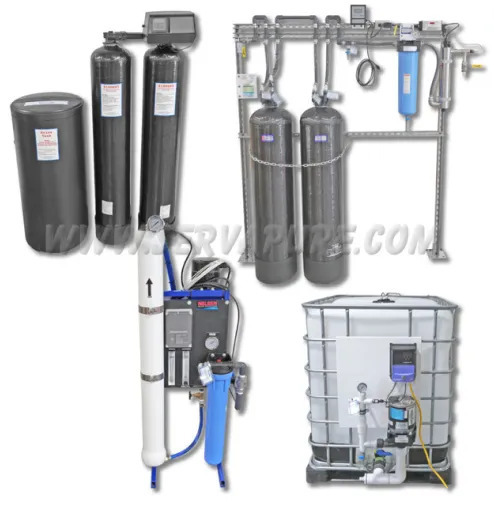SHOWING ITEMS 1-1 of 1
-

ServAPure RODI-Complete, Reverse Osmosis and Deionized Water System
MSRP: $18,000.00Your Price: $15,000.00
Trusted RODI Water Systems for Commercial and Industrial Use
A RODI water system provides a two-stage purification process, first using reverse osmosis to remove up to 99% of dissolved solids, followed by deionization to eliminate the remaining ions. This process produces ultra-pure water required for critical processes in manufacturing, healthcare, biotechnology, and analytical labs.
At Serv-A-Pure, we offer RODI systems that are pre-configured for common industrial and lab setups, as well as customizable units for unique applications. Our systems are selected for their long-term durability, high-quality materials, and consistent output. Whether you're setting up a new facility or upgrading an existing process, we offer scalable RODI systems that support both low- and high-volume needs.
Each RODI filter system is assembled with industry-standard components, including sediment pre-filters, carbon blocks, RO membranes, and DI resin beds. These parts work in tandem to ensure stable operation and compliance with water purity standards across industries. Our solutions also include monitoring equipment and flow control to help facilities maintain optimal performance with minimal manual oversight.

Benefits of a Reverse Osmosis Deionized Water System
Using a reverse osmosis deionized water system allows businesses to achieve consistent, high-purity water without relying on bottled supply or constant manual testing. These systems reduce contamination risks and provide cost-effective long-term value.
- Two-Stage Purification – Combine mechanical and chemical filtration to remove particulates, organics, and ionic contaminants.
- Reliable Output Quality – Achieve resistivity levels up to 18 megohm-cm, suitable for the most demanding applications.
- Modular & Scalable Designs – Choose the right size RODI system for your flow rate, storage, and distribution needs.
- Preassembled and Tested – Ready-to-install systems help reduce labor and setup time.
- Technical Support – Our team can assist with system sizing, design, and troubleshooting.
Common Use Cases for RODI Filter Systems
RODI systems are used anywhere water purity directly impacts performance, safety, or compliance. From research labs to production lines, these systems help facilities meet critical water quality standards.
Pharmaceutical Manufacturing
In pharmaceutical environments, even trace levels of ionic or organic contaminants can compromise product safety and efficacy. A properly configured RODI water system ensures sterile rinse cycles, clean-in-place (CIP) operations, and formulation processes meet strict purity regulations like USP and cGMP. Consistent high-purity water reduces batch variability and helps avoid costly rework.
Analytical & Research Laboratories
Sensitive instruments such as HPLC, ICP-MS, and spectrophotometers require ultra-pure water to produce accurate results. A RODI system supports Type I and Type II water requirements by removing impurities that could otherwise skew data or damage equipment. With integrated monitoring and storage options, labs can maintain water quality without constant manual oversight.
Electronics and Semiconductor Production
Semiconductor fabrication demands water with extremely low conductivity to prevent short circuits, residue buildup, or surface imperfections on wafers. A reverse osmosis deionized water system helps eliminate ions, silicates, and micro-contaminants from process water. This protects components during rinsing, plating, or etching stages and helps improve product yield.
Food and Beverage Plants
High-purity water contributes to consistent taste, texture, and shelf life in beverage and food products. A RODI filter system helps remove chlorine, hardness, and dissolved solids that may interfere with production, cleaning, or mixing. These systems also improve sanitation outcomes when integrated into automated washdown or rinse cycles.
Industrial Cleaning and Rinsing
Facilities involved in cleanroom maintenance, precision part cleaning, or glassware rinsing benefit from the spotless results produced by RODI systems. These systems reduce spotting, mineral deposits, and recontamination risks on delicate surfaces. Their use improves process repeatability and minimizes the need for manual polishing or post-cleaning steps.
Why Buy Your RODI System From Serv-A-Pure?
Since 1946, Serv-A-Pure has supplied high-purity water systems and components to commercial and industrial customers nationwide. We work closely with manufacturers, lab managers, and engineers to configure systems that meet exacting specifications. Our inventory includes proven brands, and our team is available to help with technical questions, replacement parts, and long-term maintenance planning.
FAQs About RODI Water Systems
Choosing the right RODI system requires more than just knowing your flow rate. Below are answers to some lesser-known but important questions to help guide your decision.
How often do I need to replace the DI resin in an RODI system?
Resin replacement depends on water usage and incoming water quality. In most systems, resin is replaced every 3-12 months. Regular monitoring of conductivity or resistivity levels helps determine the right schedule.
Can I connect a RODI system to an autoclave or laboratory analyzer?
Yes, many RODI systems are designed with clean connections and storage options that make them suitable for feeding autoclaves, analyzers, and other lab-grade equipment.
What is the typical rejection rate of dissolved solids by reverse osmosis membranes?
Most RO membranes reject 95% to 99% of dissolved salts and organic material, depending on feed water conditions and membrane type.
Is storage required for a RODI water system?
While some low-volume applications use water on demand, most setups benefit from a storage tank to buffer purified water and prevent system short cycling.
Need Help Configuring Your RODI Water System?
Contact Serv-A-Pure today to speak with a water purification specialist. We'll help you select the right system, understand your quality requirements, and ensure everything is set up for long-term success.
Get in Touch Today
